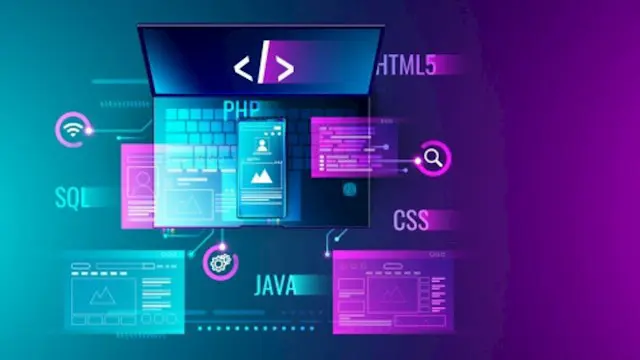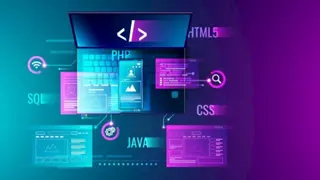
Java Programming Course
Self-paced videos, Lifetime access, Study material, Certification prep, Technical support, Course Completion Certificate
Uplatz
Summary
- Reed courses certificate of completion - Free
- Uplatz Certificate of Completion - Free
Add to basket or enquire
Overview
Uplatz provides this comprehensive course on Java Programming Fundamentals. The course consists of self-paced video lectures. You will be awarded Course Completion Certificate at the end of the course.
Java is a high-level programming language originally developed by Sun Microsystems and released in 1995. Java runs on a variety of platforms, such as Windows, Mac OS, and the various versions of UNIX. This tutorial gives a complete understanding of Java. This reference will take you through simple and practical approaches while learning Java Programming language.
Java is a powerful general-purpose programming language. It is used to develop desktop and mobile applications, big data processing, embedded systems, and so on. According to Oracle, the company that owns Java, Java runs on 3 billion devices worldwide, which makes Java one of the most popular programming languages.
Java is a class-based object-oriented programming language for building web and desktop applications. It is the most popular programming language and the language of choice for Android programming.
This tutorial would help you learn Java like a pro. Whether you are a college student looking for learn Java programming or a company employee learning advanced Java topics for building an application in Java, this Java training will definitely be useful for you.
Certificates
Reed courses certificate of completion
Digital certificate - Included
Will be downloadable when all lectures have been completed
Uplatz Certificate of Completion
Digital certificate - Included
Course Completion Certificate by Uplatz
Curriculum
Course media
Description
JAVA Programming Fundamentals - Course Curriculum
Java Overview
- How the Java Environment Works
- HelloWorld Program
- Launch Single-File Source Code
- jShell REPL
- Comments and Terminators
- Identifiers
Syntax and Types
- Java Variables
- var declarations
- Java Types
- Basic Java Types
- Reference types
- Conditional Expressions
- Logical operators
- If statement
- While Statement
- Do Statement
- For statement
- Special flow of control operators
- Switch statement
- Numerical Operators
- Casting
- Strings
Classes and Objects
- What is an Object?
- Objects and Encapsulation
- What is a Class?
- Class Object Relationship
- The Person class
- Variable types
- Constructors
- Working with the class Person
Working with Methods
- Method Definitions
- Method Arguments & Return Types
- Overloading Methods
- Method Invocations
- Defining methods
- Constructors Versus Methods
- toString() method
- Adding behaviour to the class Person
- The PersonApp program
Class Inheritance
- Inheritance in Java
- Implementing Inheritance
- Rule for overriding methods
- Rules for Polymorphic variables
- Casting and Inheritance
- The super variable
- Constructors and Inheritance
Abstract Classes, Class Side Behaviour and Final
- Abstract Classes
- Abstract Classes in Java
- Defining an Abstract Class
- Extending an Abstract Class
- Using Concrete Subclasses
- Class Side Information
- Class Side Data
- Class Side Behaviour
- Final Keyword
Java Interfaces and Enumerations
- What is an Interface in Java?
- Basic Interface Definitions
- Implementing an Interface
- Interface
- Using an Interface in a Contract
- Inheritance by Interfaces and Types
- Classes and multiple Interfaces
- Default Interface Methods
- Static Interface Methods
- Enumeration Support
- Implementing Enumerated Types
Packages
- Packages
- Class-Package Relationship
- Declaring Packages
- Packaging the Person class
- Role of the Classpath
- JAR Files
- Encapsulation and Packages
- Class modifier
- Constructor Modifier
- Variable Modifier
- Method Modifiers
- Package Summary
Java 9+ Modules
- Introduction the JPMS
- Java Platform Module System
- Why we need modules
- Look at what modules are
- How to define a module
- How to create a single module application
- How to link modules
Arrays
- What is a Java Array?
- Creating arrays of Objects
- Accessing Array Elements
- Main method args array
- Short hand from
- Ragged Arrays in Java
- Working with Ragged Arrays
- Implications of Inheritance for Arrays
- Integer Array Example
Java Generics
- Generics and Basic Types
- Generics and Their Types
- Adding Generics to your classes
- A simple user defined Generic class (the Bag class)
- Type Equality
- Generic Collection Assignment
- Generics and Inheritance
Collections Classes
- Collections API
- ArrayList
- Interfaces v Concrete Classes
- HashMap
- Iteration and Enumeration
- Queues
- Generics and Collections
- For Loops
- Boxing and Unboxing
- Raw Collections
Java 9+ Immutable Collections
- Why Immutability?
- Immutability
- of Factory method
- of Factory method
- of Factory method
- Immutable Collection Nodes
- Java 10 Enhancement
Error and Exception Handling
- Errors & Exceptions
- Exception types in Java
- Part of the Exception Hierarchy
- Exception Handling
- Local Handling
- Exception Handling Example
- Passing the Buck
- Try with Resources
- Defining new Exceptions
- Chained Exceptions
Nested / Inner Classes
- Four types of Nested / Inner Class
- Properties of Member level inner classes
- Properties of Method Inner classes
- Anonymous Method Inner classes
- Java 11 Nest-based Access
Java Functions
- Functional Programming
- Functional Programming in Java
- Functional Interfaces
- Using Functional Interfaces
- Lambdas in Java
- Closing / Capturing Variables
- Returning Functions
- Combining Functions
- Higher Order Functions
- Defining Lambdas
- Method References
Java Optional Type
- Null considered Harmful
- Java Optional Type
- Optional Variables
- Creating Optional values
- Method Summary
Java 9 Streams
- Streams
- Streams from Collections
- Terminal / Non Terminal Operators
- Creating a Stream
- Map Operation
- Collectors
- Filter operation
- Sorted operation
- ForEach
- Pipelining Operations
- Parallel Streams
- Not just collections
Files, Paths and IO Streams
- Introducing NIO.2
- Paths class and Path Interface
- The Files class
- File Attributes
- The File Watcher Service
- IO Streams
- Scanners
By the end of this course, you will have:
- Learnt about Java class and Objects
- Explored defining methods and properties
- Examined Class Inheritance
- Understood Java Interfaces and Enumerations
- Considered how to use Packages and Modules
- Learnt about Functional Programming in Java
- Understood how to handle Errors and Exceptions
- Worked with Files, paths and Stream IO
- Used the new Streams API for processing data
- Explored the Collection classes
Who is this course for?
Everyone
Requirements
Passion to learn and succeed!
Career path
- Java Programmer
- Software Programmer
- Web Developer
- Full Stack Web Developer
- Senior Java Developer
- Application Developer
- Software Engineer
- Java Servlet & JSP Programmer
- App Developer
- Cloud Architect
- Technical Lead
- Engineering Manager
- Software Testing Specialist
- Deployment Engineer
- Java Specialist
- Solution Architect
- Lead Programmer
- Product Manager
- Technical Support Analyst
Questions and answers
Is this Advanced Level Java or Immediate?
Answer:Hi Hamza This is from basic to intermediate/advanced level. Definitely starts from the basics. Team Uplatz
This was helpful.your contact number ?
Answer:Hi Houssein Apologies but as per policy, we won't be able to provide our contact details. However, our team is happy to help you. Just let us know your question(s) and we'll get back to as soon as we can. Thanks Team Uplatz
This was helpful.
Reviews
Currently there are no reviews for this course. Be the first to leave a review.
Legal information
This course is advertised on reed.co.uk by the Course Provider, whose terms and conditions apply. Purchases are made directly from the Course Provider, and as such, content and materials are supplied by the Course Provider directly. Reed is acting as agent and not reseller in relation to this course. Reed's only responsibility is to facilitate your payment for the course. It is your responsibility to review and agree to the Course Provider's terms and conditions and satisfy yourself as to the suitability of the course you intend to purchase. Reed will not have any responsibility for the content of the course and/or associated materials.


